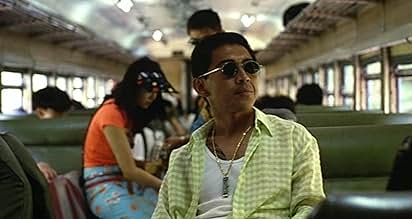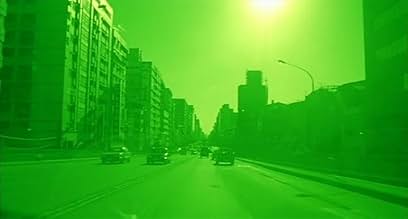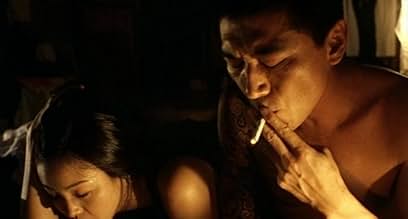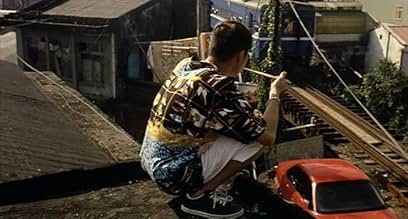PUNTUACIÓN EN IMDb
7,2/10
2,1 mil
TU PUNTUACIÓN
Un vistazo a las vidas de dos pequeños delincuentes en Taipei.Un vistazo a las vidas de dos pequeños delincuentes en Taipei.Un vistazo a las vidas de dos pequeños delincuentes en Taipei.
- Dirección
- Guión
- Reparto principal
- Premios
- 2 premios y 2 nominaciones en total
Reseñas destacadas
Goodbye South Goodbye provides a raw, harsh look on the aimless and moral-less underclass of Taiwan. The way the director Hsiao-hsien Hou made the film out to be, including his style of off-screen dialog, long continuous shots and scenes of motion creates a view that mirrors what the characters perceive and feels, whether it is helplessness, freedom and joy, calm before the storm or calm before no storm. The lost underclass that seems to be disconnected from the old and modern world, having nothing much more too look forward to except the reward of riches through whatever schemes available. But the reality is that they will only move from scheme to scheme, never achieving what they truly desires. And throughout the whole time, they will just carry on and waste away in the world that has trapped them there.
Those about to watch this modern masterpiece, be advised: you're going down a road of unexpected darkness and terror, cloaked in what appears to be the banal trappings of ordinary existence. But through the lens of Hou's camera, this is anything but ordinary.
To see this, one has to rid oneself of conventional thinking of what it means for a movie to "take" you somewhere. So when a critic whines, "I'm dying for a change of scenery!", it's obvious that they've too accustomed to standard-issue Hollywood storytelling to appreciate something entirely different and new: the mysterious, inexplicable rhythms of REAL LIFE. A life that alternates between static, stagnant waiting for things to happen, and sudden moments of motion and . The first shot explains so much of this: people who are moving and standing still at the same time -- who pass through light and darkness with the same impassive, zonked out expression, waiting for SOMETHING to happen while letting their favorite punk tune release their pent up energy, ambitions and frustrations.
So much of this film is like listening to a good song -- just allowing yourself to be bathed in sensation, to delight in little things that you notice but add so much to the overall experience. You simply can't demand standard point A to point B plot points on a movie that is interested in something entirely different. Because LIFE DOES NOT HAVE PLOT POINTS. What it does have are a multitude of wonders, in gestures, colors, and moments of surprising joy and terror. And what does it all lead to? Who knows. That's why it's life. So when someone says "Why watch a film if there's not a single worthwhile aspect to offer?" he's obviously dissassociated the experience of movies from the experience of real life.
As I've re-watched and reflected on this film, I find it to be one of the essential statements on what it's like to live in the fast lane of modern-day, globalized civilization. This film may resemble American small-time gangster flicks (most notably MEAN STREETS and GOODFELLAS) but compared to this movie those movies, as great as they are, seem simple-minded in their narrative structure and explicated themes. This film gives you the feeling of what it FEELS like to be in the shoes of these sorry saps, with all their petty ambitions and fears that end up meaning quite a lot by the time we get to that terrifying last shot, where a big nothing moment amounts to everything.
To see this, one has to rid oneself of conventional thinking of what it means for a movie to "take" you somewhere. So when a critic whines, "I'm dying for a change of scenery!", it's obvious that they've too accustomed to standard-issue Hollywood storytelling to appreciate something entirely different and new: the mysterious, inexplicable rhythms of REAL LIFE. A life that alternates between static, stagnant waiting for things to happen, and sudden moments of motion and . The first shot explains so much of this: people who are moving and standing still at the same time -- who pass through light and darkness with the same impassive, zonked out expression, waiting for SOMETHING to happen while letting their favorite punk tune release their pent up energy, ambitions and frustrations.
So much of this film is like listening to a good song -- just allowing yourself to be bathed in sensation, to delight in little things that you notice but add so much to the overall experience. You simply can't demand standard point A to point B plot points on a movie that is interested in something entirely different. Because LIFE DOES NOT HAVE PLOT POINTS. What it does have are a multitude of wonders, in gestures, colors, and moments of surprising joy and terror. And what does it all lead to? Who knows. That's why it's life. So when someone says "Why watch a film if there's not a single worthwhile aspect to offer?" he's obviously dissassociated the experience of movies from the experience of real life.
As I've re-watched and reflected on this film, I find it to be one of the essential statements on what it's like to live in the fast lane of modern-day, globalized civilization. This film may resemble American small-time gangster flicks (most notably MEAN STREETS and GOODFELLAS) but compared to this movie those movies, as great as they are, seem simple-minded in their narrative structure and explicated themes. This film gives you the feeling of what it FEELS like to be in the shoes of these sorry saps, with all their petty ambitions and fears that end up meaning quite a lot by the time we get to that terrifying last shot, where a big nothing moment amounts to everything.
This is mainly a very delayed and overdue rebuttal to the very absurd remarks the earlier user zetes commented about the film. And "yes" you can say I am one of 'em "fanatic" of Hou, if tat's how u term it. But i believe I admire the man for right and good reasons.
Did I mention how subjective film can be? I am glad that you've seen a few more of Hou's work before making the comments (although still very unfair) u did. And as much as Hitchcock's a God, i find your comparisons uncreditable and irrelevant. For one, the very context of the eating act is different in each of the films. Hitchcock being more suggestive towards the behaviour and mannerisms as a forewarn to the plot, while the act of eating for Hou's inward characters serves to not tell, but reveal, to us the now, the moment, to what the characters are doing, and more importantly, how they are going about it.
I must admit this is not a film for you if u're expecting to watch Strangers On A Train or Sunset Boulevard or E.T. for the matter. You don't compare Hitchcock and Hou, Tarkovsky and Spielberg, Copolla and Antonionni; let's not even go into the debate on genres...
And yes again, I admit, this is not a film if u haven't got a good 6hrs of sleep. But if lengthy takes and minimal cuts is not your style, don't start spewing stuff like "My guess is that Hou doesn't even KNOW how to make a film," I'm telling you he knows how to make films, and when I say that, I'm not talking bout Hitchcock's films, or Kiarostami' films, I'm talking bout Hou Hsiao-Hsien's films.
I think you should take a step back from all of this and watch it more in context with the culture and the times. Back to the eating scenes; Hou does have an affiliation towards eating and food, and that's something very culturally significant from where he comes from. OK, it's unfair, maybe because I've seen him speak about issues in his films in person.
I think the point is, I'm OK with u liking or disliking a film and give it whatever silly ratings u like, but i don't think u should be so objectively judgemental about it. Your review might seem analytical and meaningful at first, but upon deeper reading, "In every medium of art I have examined, I have never come upon an artist so thoroughly and purposefully unengaging as Hou Hsiao-hsien" it just shows how ignorant and silly your remarks are. Length does not mean credibility.
I am compelled to writing this comment only to neutralize the earlier one by zetes. So as to not mislead others who haven't yet the opportunity to catch this masterpiece by one of the greatest of Chinese filmmakers, in my opinion. And as subjective as I would preach it, this is probably my favourite, if not the most popular, of his works.
Did I mention how subjective film can be? I am glad that you've seen a few more of Hou's work before making the comments (although still very unfair) u did. And as much as Hitchcock's a God, i find your comparisons uncreditable and irrelevant. For one, the very context of the eating act is different in each of the films. Hitchcock being more suggestive towards the behaviour and mannerisms as a forewarn to the plot, while the act of eating for Hou's inward characters serves to not tell, but reveal, to us the now, the moment, to what the characters are doing, and more importantly, how they are going about it.
I must admit this is not a film for you if u're expecting to watch Strangers On A Train or Sunset Boulevard or E.T. for the matter. You don't compare Hitchcock and Hou, Tarkovsky and Spielberg, Copolla and Antonionni; let's not even go into the debate on genres...
And yes again, I admit, this is not a film if u haven't got a good 6hrs of sleep. But if lengthy takes and minimal cuts is not your style, don't start spewing stuff like "My guess is that Hou doesn't even KNOW how to make a film," I'm telling you he knows how to make films, and when I say that, I'm not talking bout Hitchcock's films, or Kiarostami' films, I'm talking bout Hou Hsiao-Hsien's films.
I think you should take a step back from all of this and watch it more in context with the culture and the times. Back to the eating scenes; Hou does have an affiliation towards eating and food, and that's something very culturally significant from where he comes from. OK, it's unfair, maybe because I've seen him speak about issues in his films in person.
I think the point is, I'm OK with u liking or disliking a film and give it whatever silly ratings u like, but i don't think u should be so objectively judgemental about it. Your review might seem analytical and meaningful at first, but upon deeper reading, "In every medium of art I have examined, I have never come upon an artist so thoroughly and purposefully unengaging as Hou Hsiao-hsien" it just shows how ignorant and silly your remarks are. Length does not mean credibility.
I am compelled to writing this comment only to neutralize the earlier one by zetes. So as to not mislead others who haven't yet the opportunity to catch this masterpiece by one of the greatest of Chinese filmmakers, in my opinion. And as subjective as I would preach it, this is probably my favourite, if not the most popular, of his works.
Goodbye South Goodbye presents a beautifully delineated portrait of a generation of Taiwanese cut off from their society's traditional values. Hou records a world stuck in short-lived businesses and scams in which the characters have no real shot at economic advancement. The characters are cold, rootless, and basically corrupt. No real communication is taking place here. It reminds me of "The Wind Will Carry Us" where the cell phone represents an intrusion of western technology in a village steeped in tradition.
This film portrays the contrast between the almost feudal tradition and its hierarchy with gangsterism and corrupt business practices. Somehow, Hou transcends this feeling of entrapment and aimlessness with long takes of lyrical beauty. For example, the green filter shown when the three are riding through a tunnel in Taipei, the three riding their motorcycles up a steep hill, a moment of grace and freedom.
The camera in this film does not judge. It simply records the unfolding of events. Hou simply discloses the character of complex relationships and situations. This film, like all of HHHs films that I've seen including his new "Millennium Mambo", is pulsating with rhythm, the rhythm of a train, the rhythm of punk music, the rhythm of life.
This film portrays the contrast between the almost feudal tradition and its hierarchy with gangsterism and corrupt business practices. Somehow, Hou transcends this feeling of entrapment and aimlessness with long takes of lyrical beauty. For example, the green filter shown when the three are riding through a tunnel in Taipei, the three riding their motorcycles up a steep hill, a moment of grace and freedom.
The camera in this film does not judge. It simply records the unfolding of events. Hou simply discloses the character of complex relationships and situations. This film, like all of HHHs films that I've seen including his new "Millennium Mambo", is pulsating with rhythm, the rhythm of a train, the rhythm of punk music, the rhythm of life.
Hou does not disguise his gratitude to Ozu, Cafe Lumiere having been conceived as a tribute to the minimalist master. Hou's Ozu-influenced visual aesthetic is hypnotic and seductive - if you are into that kind of thing. Static camera, long takes, the eschewing of close-ups: these elements can combine powerfully in some films, such as Ming-liang Tsai's What Time is it There? or Koreda's Wonderful Life. However, when the poetry is absent, you have mind-numbing tedium, such as Aoyama's Eureka.
Unfortunately, Goodbye South, Goodbye falls into Eureka territory. The fifty -second shots of tarmac rolling by reminds me of what happens when the kids get hold of the video camera on the family outing. I kind of felt what Hou was after when the three protagonists ride their scooters and joke that Big Brother's might explode, there was a moment when their rootlessness and ill-discipline was encapsulated in the frame. But it was fleeting, glimpsed and then gone. Everything around it was tedium, and difficult to follow tedium to boot.
The composition of the frames is flat and uninspiring. The acting may be profound, but who can tell when the actors are relegated to a small corner of the frame, often shrouded in darkness, and/or mumbling their lines with their backs to camera. When Flatly gets rushed, beaten and handcuffed by his cousin, I want to see the expression on his face. When the negotiations to release the hostages are happening, I want to see if the look in their eyes matches the words coming out of their mouths.
I get that it is about nihilistic existence, ennui and all that. But I didn't feel it. I watch movies to feel something. There are a million ways to be bored in life, I prefer film watching to be an exception. I can concede that this film might work on the big screen, but the DVD was a turn-off.
Unfortunately, Goodbye South, Goodbye falls into Eureka territory. The fifty -second shots of tarmac rolling by reminds me of what happens when the kids get hold of the video camera on the family outing. I kind of felt what Hou was after when the three protagonists ride their scooters and joke that Big Brother's might explode, there was a moment when their rootlessness and ill-discipline was encapsulated in the frame. But it was fleeting, glimpsed and then gone. Everything around it was tedium, and difficult to follow tedium to boot.
The composition of the frames is flat and uninspiring. The acting may be profound, but who can tell when the actors are relegated to a small corner of the frame, often shrouded in darkness, and/or mumbling their lines with their backs to camera. When Flatly gets rushed, beaten and handcuffed by his cousin, I want to see the expression on his face. When the negotiations to release the hostages are happening, I want to see if the look in their eyes matches the words coming out of their mouths.
I get that it is about nihilistic existence, ennui and all that. But I didn't feel it. I watch movies to feel something. There are a million ways to be bored in life, I prefer film watching to be an exception. I can concede that this film might work on the big screen, but the DVD was a turn-off.
¿Sabías que...?
- CuriosidadesConsidered by Cahiers du Cinéma to be one of the three best films of the 1990's, alongside The Bridges of Madison County and Carlito's Way.
- ConexionesFeatured in Guang yin de gu shi: Tai wan xin dian ying (2014)
Selecciones populares
Inicia sesión para calificar y añadir a tu lista para recibir recomendaciones personalizadas
- How long is Goodbye South, Goodbye?Con tecnología de Alexa
Detalles
Contribuir a esta página
Sugerir un cambio o añadir el contenido que falta
























